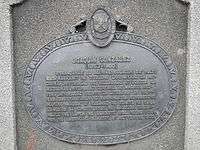Joaquín González (politician)
| Dr. Joaquín González | |
|---|---|
 | |
| Born |
July 22, 1853 Baliuag, Bulacan, Captaincy General of the Philippines |
| Died |
September 21, 1900 (aged 47) Malate, Manila, Philippine Islands |

Joaquín González (July 22, 1853 - September 21, 1900) was a Filipino politician and a member of the Malolos Congress that wrote the Malolos Constitution, the first Philippine constitution, after the country declared independence from Spain in 1898. He was one of two elected delegates representing the province of Pampanga, the other being Jose Rodriguez Infante. Along with Felipe Calderon y Roca, the main author of the constitution, Dr. González was part of a committee that took part in the debates that went article by article from October 25 to November 29, 1898.[1]
Early life and training
Dr. González was a Spanish mestizo born out of the union of Fausto López (from Valladolid, Spain) and María Amparo González y de los Ángeles (from Baliuag, Bulacan). He was trained as a Doctor of Medicine in Spain at the Universidad de Valladolid and the Universidad Central de Madrid (now the Complutense University of Madrid). He later attended the Ophthalmology Institute of Dr. Wecker in Paris, France, to specialize in eye diseases. It is said that José Rizal worked for some time in the same institute though the two Filipinos never met.
Career
On October 19, 1898, Dr. González was designated as the first Rector/President of the Universidad Cientifico-Literaria de Filipinas, the forerunner of the University of the Philippines by Philippine President Emilio Aguinaldo. The university had faculties of civil and criminal laws, as well as medicine and surgery.[2] He taught legal medicine, toxicology and public hygiene.
In April 1899, Dr. González became one of seven members of the Permanent Commission of the National Assembly[1] under the Malolos Constitution that had oversight powers over the President of the Republic, Representatives, Cabinet Secretaries, the Chief Justice and the Solicitor General during adjournment of the Assembly.[3]
Family
He married Florencia Sioco y Rodríguez (1860-1925) and had ten sons, namely, Fernando, Jesus, Emilio, Augusto (father of former Secretary of Education Andrew Gonzalez), Octavio, Virgilio, Javier, Bienvenido (6th President of the University of the Philippines), Joaquin and Fausto (former Congressman of Pampanga).
Death
Dr. González died of acute appendicitis in Malate, Manila on September 21, 1900. A grand national manifestation of bereavement was declared, and the funeral cortege was attended by the entire Civil Commission headed by its first president and American Governor General, William Howard Taft; American military authorities; illustrious Filipinos and a multitude of people.[4]
References
- 1 2 Kalaw, Maximo M. (1927). The Development of Philippine Politics. Oriental Commercial. pp. 127, 130.
- ↑ Agoncillo, Teodoro A. (1980). Ang Pilipinas at Mga Pilipino, Noon at Ngayon (The Philippines and the Filipinos, Then and Now). Garotech Publishing, Quezon City, Philippines.
- ↑ "Article 55, Title VI, Malolos Constitution". Retrieved 17 June 2014.
- ↑ Gonzalez, Gene R. (1993). Cocina Sulipena: Culinary Gems of Old Pampanga. Bookmark, Manila. p. 29.